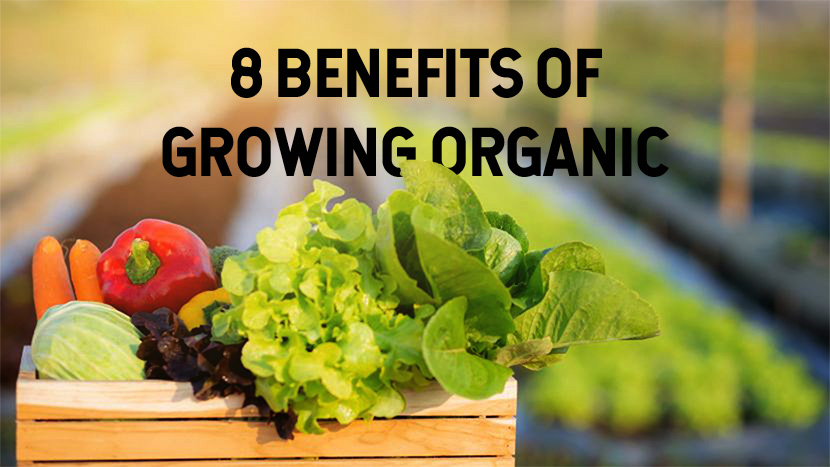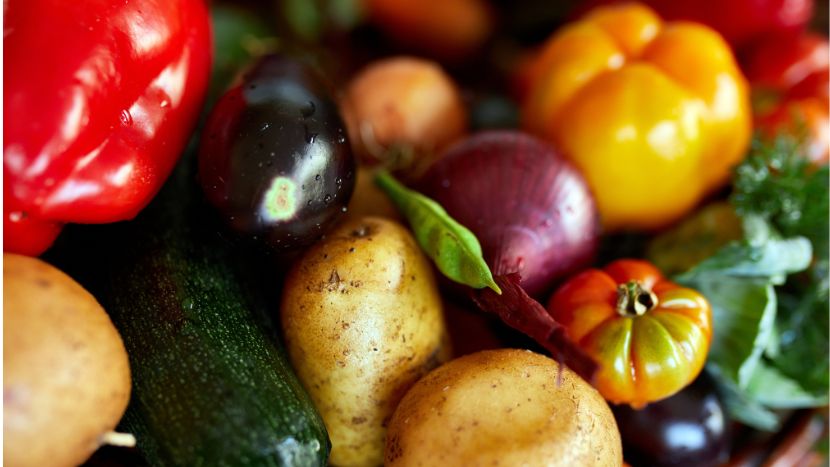8 Surprising Benefits of Organic Produce for Our Ecosystem
Glance down the aisles of any grocery store, and you’re likely to be bombarded by the kaleidoscopic symphony of fruits and veggies.
Yet, amidst the rainbow of choices, the vibrant hues of organic produce often manage to stand out. There’s more to them than just their aesthetic appeal – it’s about cultivating something akin to a food love story, one where every leafy green promises not just goodness for our bodies but an outpouring of benefits for our ailing ecosystem.
In this blog post, we’ll explore the delightful bonanza that is organic produce, uncovering how your choice of carrot can lead to a cascade of ecological wins.
What Is Organic Farming?
Before we start cherry-picking the benefits, it’s important to add a pinch of context. When we talk about organic produce, we’re referring to crops grown without the use of synthetic pesticides and synthetic fertilizers.
The practice focuses on maintaining soil health and avoids any additions – namely harmful chemicals – excluding those that are naturally derived from plant and animal sources.
So, long story short, organic produce is chemical-free.
Benefits of Organic Produce
Now that you know what organic produce is, what are its benefits?
1. Enhanced Soil Quality
Ripe for discussion, you ask what organic does for the dirt underfoot. Frankly, it’s all the difference between a desert and Eden.
Organic farms thrive on natural cycles, eschewing the need for synthetic enhancements. They hand the reins back to biological entities like bacteria and mycorrhizal fungi, ensuring the soil isn’t depleted from a chemical hangover.
By opting for organic, we’re coating the earth in the equivalent of a spa-day mud-pack. The integrity of soil, our bedrock of nutrition, is sustained and even veined with quality thanks to organic’s consistent coaxing with compost. The result? A buffer of fertile shadows, promoting the growth of lush and healthy produce beds.
2. Reduction in Chemical Runoff
When conventional farming sprays its Picasso of pesticides, the overrun doesn’t stay within the lines of the farmland. A toxic splash lands in waterways, trickling trouble to every nook of our aquatic systems. Unlike the ghoulish green of synthetic ad juice, the organic approach leave the colors of our rivers and oceans blue in the cleanest, most serene shades.
By absorbing this charge, organic farming champions a cleaner canvas for aqueous life. No puff of chemicals that could intoxicate our generous schoolers and leapers of the water world.
This reduction in harmful runoff is not merely a washout; it’s actually setting the table for the water’s next seafood buffet to be healthier for other ocean organisms, but also the humans at the head of the feast.
3. Promoting Responsible Consumption
The organic movement isn’t just a solo act; it’s an ensemble piece that celebrates the producers, the consumers, and the planet. With innovative meal kit services cropping up, connections are being forged between individuals and the broader environmental effects of their choices.
Each bite of organically sourced cuisine is a vote for a greener future, a chance to enjoy a meal that nourishes both the body and Earth. The rise of services that deliver organic, low-carb dishes to your doorstep isn’t just a convenience; it’s a rallying point for mindful consumption.
Every time we choose an organic approach, we’re voting at the table for a future that can feed our planet without later starving it. These responsible ripples, borne from a single dietary decision, are the seeds of systemic change, sowing an ecosystem that reaps the rewards of our collective culinary wisdom.
4. Lower Energy Consumption
Step into any garden, and you can practically feel the breeze of well-being where organic practices reign. How’s that for a ‘cool’ advantage?
Organic farms trade the frenetic fire of mechanized energy for the slow power of natural cycles. Imagine fields without the constant hiss of carbon-breathing machinery use to apply chemicals – and you have the serenity of energy conservation in full view.
The numbers whisper tales of tranquility – less energy required for production means lower greenhouse gas emissions. At a time when global warming is the climactic villain in our narrative, organic agriculture’s low-energy solution writes a cooler, cleaner plotline.
5. Promotion of Water Conservation
Water is the elixir of life, and in the age of droughts and desertification, organic farms are the saints of sustainability.
The methods of organic production, from nutrient retention to improved soil structure and less spraying, all lead down the path of water conservation. They act as a sponge for this precious resource instead of a sieve, holding it in the earth-bound reservoirs of a healthy environment and nourishing thirsty crops without evaporating reserves.
The implications are profound; less need for irrigation translates to less strain on water reserves and anguished rivers alike. Every drop saved through organics is not just a retreat from waste; it’s a step towards the preservation of our lifeblood.
6. Support for Local Wildlife
Those bustling fields of organic produce aren’t just idyllic for farmers; they serve as bustling habitats for wildlife. The very nature of non-invasive farming methods means that local flora and fauna can coexist in a blissful state of biodiversity.
These organic meadows are sanctuaries to beleaguered bees and butterflies, providing safe havens that non-organic environments, stacked with chemicals like a lab gone awry, can’t offer.
It’s a chorus of crickets and a ballet of balanced ecosystems where organic farms are the oases in our modern metropolises. In fostering these biodiverse bolsterers, we’re not only making the planet healthier, we’re creating a richer and more resilient environment for our children.
7. Increased Biodiversity
If organic farms were a gallery, mainstream agriculture could take a lesson or two on its exhibition of diversity. Non-organic methods sometimes leave us with the crop-centric equivalent of a one-hit-wonder.
But whereas traditional farms are like queues for iPhones, single-minded and somewhat barren, organic landscapes witness the actual wild side of nature.
With organic agriculture, we support a symphony of species, not just our one-hit wonders, the crops. Beneficial insects like ladybugs not only see the light of day but are the lighthouses of their own invertebrate oceans.
8. Contribution to Human Health
“We are what we eat” – or so the adage goes. Organic food isn’t just a hedonistic preference for some. It’s a health imperative for many, a way to sidestep the chemical alley that conventional produce may sometimes lead us down.
Beyond the supermarket serenade of ‘pesticide-free’ labels lies a deeper truth – organic produce isn’t just devoid of chemicals; it’s abundant in health-promoting nutrients. Studies suggest that consuming organic fare may be associated with a lower risk of certain diseases, marking a win for both our bodies and our long-term well-being.
Conclusion
The organic odyssey isn’t just the sum of its individual benefits; it’s a rich tapestry of interconnected advantages. It feeds our bodies and bolsters our ecosystems with a bounty that doesn’t just taste better – it does better.
By choosing organic, we’re not just nurturing our health; we’re nurturing a planet that desperately needs its parsnips pampered and its leeks loved.
This shift isn’t just the hallmark of eco-enthusiasts; it’s the next chapter for all of us. The walk we take in the produce section is more than a physical aisle hop. It’s a stroll towards a greener, cleaner future, and the taste of that promise isn’t just sweet – it’s organically delicious.


































































































